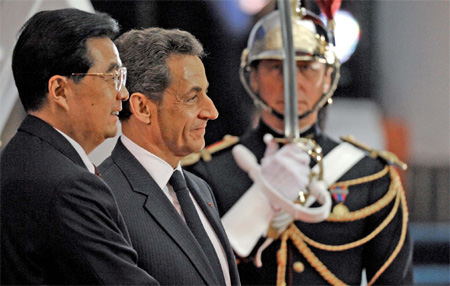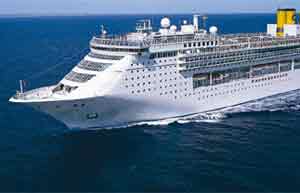China adopts wait-and-see position
Updated: 2011-11-04 08:55
By Andrew Moody and Lu Chang (China Daily)
|
|||||||||
|
Chinese President Hu Jintao and French President Nicolas Sarkozy ahead of the G20 summit in Cannes, on Nov 2. Thomas Coex / Associated Press |
Hu: We want to see stability in eurozone
The specter of Greece being the first country to exit the eurozone loomed large as the G20 summit opened in Cannes on Nov 3.
One of the main aims of the summit was to look at ways to foster economic growth against an increasingly gloomy financial backdrop; but the announcement on Nov 1 by Greek Prime Minister George Papandreou to put measures agreed at a crisis meeting last week in Brussels to a referendum in early December has wrongfooted everyone.
Chinese President Hu Jintao in an interview with Le Figaro ahead of the summit, maintained it was in everyone's interest to have a stable euro. China "sincerely wishes to see stability in the eurozone and the euro," he told the French newspaper.
Hu met with both new IMF managing director Christine Lagarde and French president Nicolas Sarkozy to discuss the emerging crisis on Wednesday.
It had been hoped that China would have been able to give an undertaking at the summit to buy EFSF (European Financial Stability Facility) bonds. The facility has been set up as an emergency fund to deal with the euro sovereign debt crisis.
In Brussels last week, European leaders agreed to bolster the fund by 440 billion euros ($605 billion) to 1 trillion euros. It was hoped it would lure in some of China's 2.3 trillion euros ($3.2 trillion) of foreign exchange reserves.
But Zhu Guangyao, China's deputy finance minister, told reporters in Cannes on Nov 3 it would not be investing any of its foreign exchange reserves in new bonds until the Greek position had been clarified.
"The fund has not established details of its investment options so we still can't talk about the issue of investing," he said.
Zhu added Papandreou's announcement had surprised the Chinese as much as anyone else. "Like our European friends, we did not expect a Greek referendum. It was an independent decision taken by Greece. I hope this period of uncertainty would be contained," he said.
However, Beijing could provide up to $100 billion (73 billion euros) to support the debt-wracked eurozone, Li Daoku, a member of the Chinese central bank's monetary policy committee said in an interview on Nov 3 to French daily Le Figaro.
The head of the EFSF, Klaus Regling, traveled to Beijing last week for talks about a possible contribution.
"China is ready to help Europe, it is clear, but there are at least two preliminary conditions" to fulfill, said Li, according to AFP.
The first is that the EFSF will be effective at stabilizing Europe's debt crisis.
"Beijing wants to be certain that the mechanisms work," said Li.
"Nothing would be worse for China than to contribute to something that ends up failing in several months."
The second condition concerns what sort of guarantees will be offered in case the bailout fails, said Li, in particular if they will be backed by France and Germany.
Michael Pettis, professor of finance at Peking University, says it is unrealistic to expect the Chinese to resolve the situation.
"This great hope that China will step in and do what Germans are afraid to do is not terribly realistic. I don't think it is in China's interests to do that. There is a perception that China can actually step in because it has this huge amount of reserves," he says.
Wu Changqi, associate dean and professor of strategic management at Guanghua School of Management in Beijing, says a lot of questions would be asked in China if the government continually bailed out wealthy Europeans.
"People forget the Chinese government would have to explain to its people why it was helping rich Europeans all the time," he said.
The G20 Summit, although including nations of the leading eurozone currencies, has no direct jurisdiction over the single currency itself.
The official agenda will instead focus also on other issues such as global macroeconomic imbalances and strengthening financial regulation and checking rising commodity prices.
Clearly, however, leaders will not be able to ignore the growing euro crisis.
"I think they will talk a lot about the Europe debt crisis but they will not achieve anything," said Martin Feldstein, professor of economics at Harvard University and former chairman of the Council of Economic Affairs at the White House on a visit to Beijing this week.
"The Europeans want China and others to invest in their bonds but I will be very surprised if China, Japan or anyone else will want to take the risk," he said.
China has a greater stake in Greece already than many countries. It has signed a 35-year lease to expand two main container terminals at the main Piraeus port. It also concluded shipping agreements last year worth 500 million euros. It will be directly involved in the mayhem if Greece does return to the drachma next year.
Some such as Pettis at Peking University already believe that is inevitable.
"They are going to leave the euro one way or another. What is more all the countries economically below France, including Italy, Spain, Portugal, Ireland; and maybe Hungary and Belgium are now in the firing line," he said.












